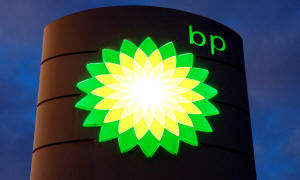BP makes record profit in 2022, boosts oil spending
 Send a link to a friend
Send a link to a friend
 [February 07, 2023]
By Ron Bousso and Shadia Nasralla [February 07, 2023]
By Ron Bousso and Shadia Nasralla
LONDON (Reuters) - BP on Tuesday reported a record profit of $28 billion
for 2022 while boosting its dividend in a sign of confidence as it
sharply raised overall spending plans and scaled back ambitions to
reduce oil and gas output by 2030.
The blockbuster profit follows similar reports from rivals Shell, Exxon
Mobil and Chevron last week after energy prices surged in the wake of
Russia's invasion of Ukraine, prompting new calls to further tax the
sector as households struggle to pay energy bills.
Three years after Chief Executive Bernard Looney took the helm with an
ambitious plan to pivot BP away from oil and gas towards renewables and
low-carbon energy, the company said it will increase annual spending in
both sectors by $1 billion with a sharper focus on developing low-carbon
biofuels and hydrogen.
But it scaled back plans to cut oil output, now aiming to produce 2
million barrels of oil equivalent per day by 2030, down just 25% from
2019 levels compared with previous plans for a 40% cut.
While many investors backed Looney's strategy, which he told Reuters "is
working", BP's shares have been the worst performers among top Western
energy companies since the CEO took office, remaining largely flat
compared with a 17% gain for Shell and a nearly 80% gain in Exxon
shares.

BP's $4.8 billion fourth-quarter underlying replacement cost profit, the
company's definition of net income, narrowly missed a $5 billion
forecast in a company-provided survey of analysts and compared with $4
billion a year earlier and $8.2 billion in the third quarter.
The results were impacted by weaker gas trading activity after an
"exceptional" third quarter, higher refinery maintenance and lower oil
and gas prices.
But for the year, BP's $27.6 billion profit exceeded its previous record
of $26 billion in 2008 despite a $25 billion writedown of its Russian
assets.
That allowed it to boost its dividend by 10% to 6.61 cents per share,
after halving it in the wake of the pandemic, and announce plans to
repurchase $2.75 billion worth of shares over the next three months
after buying $11.7 billion in 2022.
BP shares were 5% higher by 1050 GMT.
ENERGY TRANSITION
BP reiterated plans to divide its spending over the period to 2030
equally on the oil and gas business and its energy transition
businesses, upping the total budget to up to $18 billion from a
previously guided upper range of $16 billion.
[to top of second column] |

The logo of BP is seen at a petrol
station in Kloten, Switzerland October 3, 2017. REUTERS/Arnd
Wiegmann

Transition businesses, such as renewables and electric vehicle
charging, account for around 30% of the current budget compared with
3% in 2019.
"In a departure from its peers, it would appear that criticisms of
its spending on renewables has started to sting," said Michael
Hewson, Chief Market Analyst at CMC Markets UK.
BP's kept it returns outlook for renewables largely unchanged at
6%-8%, without the effect of debt, even though global offshore wind
production costs have soared in recent months.
Looney said BP's wind and solar production will focus more on
providing renewable power to generate biofuels and low-carbon
hydrogen, doubling down, particularly in the United States where the
landmark Inflation Reduction Act offers investment credits and tax
cuts.
BP, whose trading operations further boost renewables returns,
maintained plans to have 50 gigawatt of renewable projects under
development and 10 GW operating by 2030.
It said it expects returns of upwards of 15% from its bioenergy
business and its combined electric vehicle charging and convenience
store businesses, while looking for double-digit returns on
hydrogen.
It aims to translate this into a core profit from the transition
businesses of $10 billion-$12 billion by 2030, out of targeted total
group earnings before interest, tax, depreciation and amortisation
(EBITDA) of $51 billion-$56 billion.
BP also wants to increase its focus on renewable natural gas having
last year acquired U.S. producer Archaea Energy for $4.1 billion,
and it has also set a target to produce 0.5 million-0.7 million
tonnes a year of low-carbon hydrogen to initially supply its own
refineries.
BP will focus its global oil and gas operations in nine regions,
with plans to sharply increase output from its U.S. shale business
and in the Gulf of Mexico.
(Reporting by Ron Bousso and Shadia Nasralla; Editing by Andrew
Heavens, Louise Heavens, Kirsten Donovan)
[© 2023 Thomson Reuters. All rights
reserved.]
This material may not be published,
broadcast, rewritten or redistributed.
Thompson Reuters is solely responsible for this content.
 |